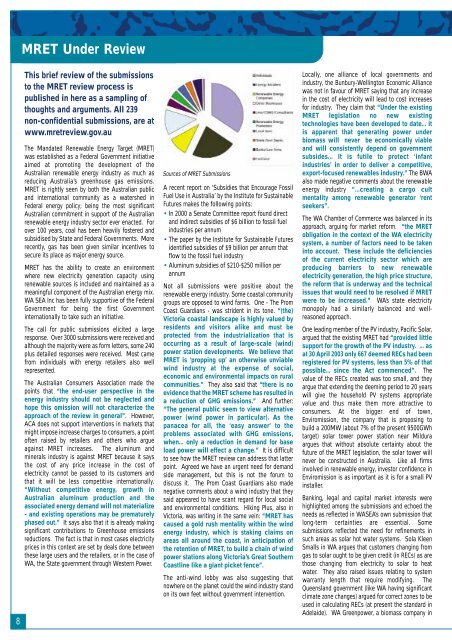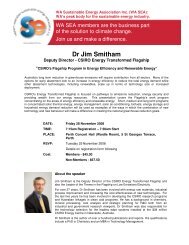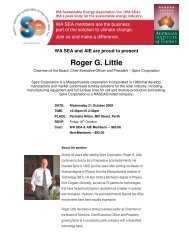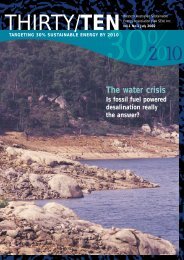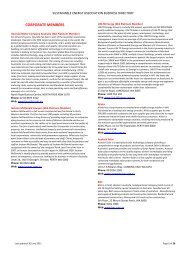THIRTY/TEN
Volume 2 No2 - June 2003 - SEA
Volume 2 No2 - June 2003 - SEA
- No tags were found...
Create successful ePaper yourself
Turn your PDF publications into a flip-book with our unique Google optimized e-Paper software.
MRET Under Review<br />
8<br />
This brief review of the submissions<br />
to the MRET review process is<br />
published in here as a sampling of<br />
thoughts and arguments. All 239<br />
non-confidential submissions, are at<br />
www.mretreview.gov.au<br />
The Mandated Renewable Energy Target (MRET)<br />
was established as a Federal Government initiative<br />
aimed at promoting the development of the<br />
Australian renewable energy industry as much as<br />
reducing Australia’s greenhouse gas emissions.<br />
MRET is rightly seen by both the Australian public<br />
and international community as a watershed in<br />
Federal energy policy; being the most significant<br />
Australian commitment in support of the Australian<br />
renewable energy industry sector ever enacted. For<br />
over 100 years, coal has been heavily fostered and<br />
subsidised by State and Federal Governments. More<br />
recently, gas has been given similar incentives to<br />
secure its place as major energy source.<br />
MRET has the ability to create an environment<br />
where new electricity generation capacity using<br />
renewable sources is included and maintained as a<br />
meaningful component of the Australian energy mix.<br />
WA SEA Inc has been fully supportive of the Federal<br />
Government for being the first Government<br />
internationally to take such an initiative.<br />
The call for public submissions elicited a large<br />
response. Over 3000 submissions were received and<br />
although the majority were as form letters, some 240<br />
plus detailed responses were received. Most came<br />
from individuals with energy retailers also well<br />
represented.<br />
The Australian Consumers Association made the<br />
points that “the end-user perspective in the<br />
energy industry should not be neglected and<br />
hope this omission will not characterize the<br />
approach of the review in general”. However,<br />
ACA does not support interventions in markets that<br />
might impose increase charges to consumers, a point<br />
often raised by retailers and others who argue<br />
against MRET increases. The aluminum and<br />
minerals industry is against MRET because it says<br />
the cost of any price increase in the cost of<br />
electricity cannot be passed to its customers and<br />
that it will be less competitive internationally.<br />
“Without competitive energy, growth in<br />
Australian aluminum production and the<br />
associated energy demand will not materialize<br />
- and existing operations may be prematurely<br />
phased out.” It says also that it is already making<br />
significant contributions to Greenhouse emissions<br />
reductions. The fact is that in most cases electricity<br />
prices in this context are set by deals done between<br />
these large users and the retailers, or in the case of<br />
WA, the State government through Western Power.<br />
Sources of MRET Submissions<br />
A recent report on ‘Subsidies that Encourage Fossil<br />
Fuel Use in Australia’ by the Institute for Sustainable<br />
Futures makes the following points:<br />
• In 2000 a Senate Committee report found direct<br />
and indirect subsidies of $6 billion to fossil fuel<br />
industries per annum<br />
• The paper by the Institute for Sustainable Futures<br />
identified subsidies of $9 billion per annum that<br />
flow to the fossil fuel industry<br />
• Aluminum subsidies of $210-$250 million per<br />
annum<br />
Not all submissions were positive about the<br />
renewable energy industry. Some coastal community<br />
groups are opposed to wind farms. One - The Prom<br />
Coast Guardians - was strident in its tone. “(the)<br />
Victoria coastal landscape is highly valued by<br />
residents and visitors alike and must be<br />
protected from the industrialization that is<br />
occurring as a result of large-scale (wind)<br />
power station developments. We believe that<br />
MRET is ‘propping up’ an otherwise unviable<br />
wind industry at the expense of social,<br />
economic and environmental impacts on rural<br />
communities.” They also said that “there is no<br />
evidence that the MRET scheme has resulted in<br />
a reduction of GHG emissions.” And further:<br />
“The general public seem to view alternative<br />
power (wind power in particular). As the<br />
panacea for all, the ‘easy answer’ to the<br />
problems associated with GHG emissions,<br />
when... only a reduction in demand for base<br />
load power will effect a change.” It is difficult<br />
to see how the MRET review can address that latter<br />
point. Agreed we have an urgent need for demand<br />
side management, but this is not the forum to<br />
discuss it. The Prom Coast Guardians also made<br />
negative comments about a wind industry that they<br />
said appeared to have scant regard for local social<br />
and environmental conditions. Hiking Plus, also in<br />
Victoria, was writing in the same vein: “MRET has<br />
caused a gold rush mentality within the wind<br />
energy industry, which is staking claims on<br />
areas all around the coast, in anticipation of<br />
the retention of MRET, to build a chain of wind<br />
power stations along Victoria’s Great Southern<br />
Coastline like a giant picket fence”.<br />
The anti-wind lobby was also suggesting that<br />
nowhere on the planet could the wind industry stand<br />
on its own feet without government intervention.<br />
Locally, one alliance of local governments and<br />
industry, the Bunbury-Wellington Economic Alliance<br />
was not in favour of MRET saying that any increase<br />
in the cost of electricity will lead to cost increases<br />
for industry. They claim that “Under the existing<br />
MRET legislation no new existing<br />
technologies have been developed to date... it<br />
is apparent that generating power under<br />
biomass will never be economically viable<br />
and will consistently depend on government<br />
subsides... It is futile to protect ‘infant<br />
industries’ in order to deliver a competitive,<br />
export-focused renewables industry.” The BWA<br />
also made negative comments about the renewable<br />
energy industry “...creating a cargo cult<br />
mentality among renewable generator ‘rent<br />
seekers”.<br />
The WA Chamber of Commerce was balanced in its<br />
approach, arguing for market reform. “the MRET<br />
obligation in the context of the WA electricity<br />
system, a number of factors need to be taken<br />
into account. These include the deficiencies<br />
of the current electricity sector which are<br />
producing barriers to new renewable<br />
electricity generation, the high price structure,<br />
the reform that is underway and the technical<br />
issues that would need to be resolved if MRET<br />
were to be increased.” WA’s state electricity<br />
monopoly had a similarly balanced and wellreasoned<br />
approach.<br />
One leading member of the PV industry, Pacific Solar,<br />
argued that the existing MRET had “provided little<br />
support for the growth of the PV industry. ... as<br />
at 30 April 2003 only 667 deemed RECs had been<br />
registered for PV systems, less than 5% of that<br />
possible... since the Act commenced”. The<br />
value of the RECs created was too small, and they<br />
argue that extending the deeming period to 20 years<br />
will give the household PV systems appropriate<br />
value and thus make them more attractive to<br />
consumers. At the bigger end of town,<br />
Enviromission, the company that is proposing to<br />
build a 200MW (about 7% of the present 9500GWh<br />
target) solar tower power station near Mildura<br />
argues that without absolute certainty about the<br />
future of the MRET legislation, the solar tower will<br />
never be constructed in Australia. Like all firms<br />
involved in renewable energy, investor confidence in<br />
Enviromission is as important as it is for a small PV<br />
installer.<br />
Banking, legal and capital market interests were<br />
highlighted among the submissions and echoed the<br />
needs as reflected in WASEA’s own submission that<br />
long-term certainties are essential. Some<br />
submissions reflected the need for refinements in<br />
such areas as solar hot water systems. Sola Kleen<br />
Smalls in WA argues that customers changing from<br />
gas to solar ought to be given credit (in RECs) as are<br />
those changing from electricity to solar to heat<br />
water. They also raised issues relating to system<br />
warranty length that require modifying. The<br />
Queensland government (like WA having significant<br />
climate zone changes) argued for correct zones to be<br />
used in calculating RECs (at present the standard in<br />
Adelaide). WA Greenpower, a biomass company in


